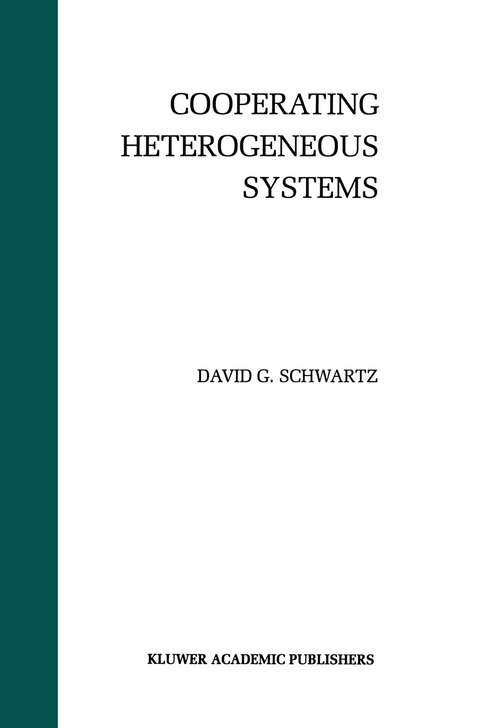
Cooperating Heterogeneous Systems
Seiten
1994
Springer (Verlag)
978-0-7923-9535-5 (ISBN)
Springer (Verlag)
978-0-7923-9535-5 (ISBN)
Cooperating Heterogeneous Systems provides an in-depth introduction to the issues and techniques surrounding the integration and control of diverse and independent software components. Organizations increasingly rely upon diverse computer systems to perform a variety of knowledge-based tasks. This presents technical issues of interoperability and integration, as well as philosophical issues of how cooperation and interaction between computational entities is to be realized. Cooperating systems are systems that work together towards a common end. The concepts of cooperation must be realized in technically sound system architectures, having a uniform meta-layer between knowledge sources and the rest of the system. The layer consists of a family of interpreters, one for each knowledge source, and meta-knowledge. A system architecture to integrate and control diverse knowledge sources is presented. The architecture is based on the meta-level properties of the logic programming language Prolog. An implementation of the architecture is described, a Framework for Logic Programming Systems with Distributed Execution (FLiPSiDE).
Knowledge-based systems play an important role in any up-to-date arsenal of decision support tools. The tremendous growth of computer communications infrastructure has made distributed computing a viable option, and often a necessity in geographically distributed organizations. It has become clear that to take knowledge-based systems to their next useful level, it is necessary to get independent knowledge-based systems to work together, much as we put together ad hoc work groups in our organizations to tackle complex problems.
The book is for scientists and software engineers who have experience in knowledge-based systems and/or logic programming and seek a hands-on introduction to cooperating systems. Researchers investigating autonomous agents, distributed computation, and cooperating systems will find fresh ideas and new perspectives on well-established approaches to control, organization, and cooperation.
Knowledge-based systems play an important role in any up-to-date arsenal of decision support tools. The tremendous growth of computer communications infrastructure has made distributed computing a viable option, and often a necessity in geographically distributed organizations. It has become clear that to take knowledge-based systems to their next useful level, it is necessary to get independent knowledge-based systems to work together, much as we put together ad hoc work groups in our organizations to tackle complex problems.
The book is for scientists and software engineers who have experience in knowledge-based systems and/or logic programming and seek a hands-on introduction to cooperating systems. Researchers investigating autonomous agents, distributed computation, and cooperating systems will find fresh ideas and new perspectives on well-established approaches to control, organization, and cooperation.
I Foundations.- 1 Introduction.- 2 Blackboard Systems.- 3 Cooperation in Organizations.- 4 Meta4: Knowledge, Architecture, Programs and Control.- II Creations.- 5 Flipside: A Framework for Logic Programming Systems with Distributed Execution.- 6 A Meta-Layer for Knowledge Sources.- 7 Knowledge Source Integration.- 8 Control of Knowledge Sources.- 9 Blacklog: Flipside as a Process-Oriented Prolog.- III Evaluations.- 10 A Cdps Analysis of Flipside.- 11 Related Work.- 12 Conclusions.- References.
| Reihe/Serie | The Springer International Series in Engineering and Computer Science ; 299 |
|---|---|
| Zusatzinfo | XIX, 203 p. |
| Verlagsort | Dordrecht |
| Sprache | englisch |
| Maße | 155 x 235 mm |
| Themenwelt | Informatik ► Theorie / Studium ► Künstliche Intelligenz / Robotik |
| ISBN-10 | 0-7923-9535-2 / 0792395352 |
| ISBN-13 | 978-0-7923-9535-5 / 9780792395355 |
| Zustand | Neuware |
| Haben Sie eine Frage zum Produkt? |
Mehr entdecken
aus dem Bereich
aus dem Bereich
Buch | Softcover (2024)
REDLINE (Verlag)
20,00 €
Eine kurze Geschichte der Informationsnetzwerke von der Steinzeit bis …
Buch | Hardcover (2024)
Penguin (Verlag)
28,00 €


